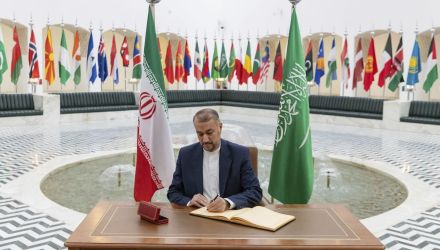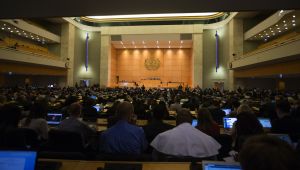PHOENIX, Arizona -- The American government‘s decision to join the international negotiations with Iran over the latter's nuclear energy program is a historical marker or immense importance -- certainly one of the most important diplomatic turning points of our time, in my view. It marks the first time in recent memory when a developing country branded as part of the ‘Axis of Evil' by the last American administration forced the current president in Washington to reverse American policy and make what might appear to be a humiliating about-face -- more or less admitting defeat in the face of Iranian resistance, defiance and persistence.
The core of this reversal in American policy pertains to the fact that Washington now will join the 5+1 group (the five permanent members of the UN Security Council plus Germany) who have been negotiating fruitlessly with Iran for some years in the continuing negotiations on Iran‘s nuclear industry. The George W. Bush administration had insisted that it would only negotiate with Iran if Tehran suspended uranium enrichment, and had led several rounds of UN Security Council sanctions against Iran. So now the United States is negotiating with an Iran that moves ahead with its enrichment.
This is not a sign of weakness by the United States, but rather a sign of wisdom and realism for which it should be commended. The Obama administration was sensible enough to realize that the aggressive Bush policy had failed, for many reasons The US was fighting a losing battle, against a determined foe. It took real courage and self-confidence for the Obama team to change their policy without feeling that the US was humiliated and lessened in the eyes of the world. Exactly the opposite is happening: The United States will be more respected for behaving rationally, instead of behaving idiotically and hypocritically -- as it had done under Bush and his Minister of Mindlessness Condoleezza Rice.
It is critically important that these negotiations succeed, because lowering the temperature between the United States and Iran -- and allowing Tehran to enjoy normal relations with the leading Western powers -- is the most important way to make progress on the many other localized conflicts and tension points in the Arab-Asian region. Two things would now seem to take priority.
The first is for Iran to reciprocate the American move. The Iranian supreme leader and president have both said in recent weeks that Iran would welcome talks with the United States if these were held in a context of seriousness, trust and reciprocity. They said Iran would act in good faith if the US would do so. The American decision to drop its failed old policy and join the negotiations is a procedural move that should be reciprocated by a move of equal magnitude by Iran. It could be related to non-nuclear issues -- like promoting more people-to-people relations -- or it could be related to issues like inspections of its nuclear facilities, providing some but not all answers to lingering questions about its alleged nuclear weapons program, or even a symbolic move like suspending enrichment for two months in 2,000 of its 7,000 enriched uranium-producing spinning centrifuges -- perhaps because they needed cleaning or maintenance.
Every sign of wisdom, humility and courage deserves a counter-sign. This is the moment Iran has been working towards for years -- to show that it negotiates with the United States on equal terms, after forcing the US to accept its position. This is a moment and an opportunity that Iran should not waste, but neither should it gloat about its success to date, or over-play its hand.
The second thing that should happen is that both sides should work more diligently to redefine the aim of the current negotiations. Iran has a uranium enrichment program, so preventing it from mastering this technology is no longer a realistic goal. Suspending all its enrichment does not seem logical either. More realistic, as Harvard University professor Stephen Walt and others argue, is preventing the development of an Iranian nuclear bomb.
When I asked his fellow Harvard professor Steven Miller -- a leading American expert on nuclear non-proliferation who also knows Iran from visits there -- what we could expect from such an approach, he quickly listed a series of points that Iran had already said it would accept or would seriously discuss, and that would help ensure that it did not weaponize its nuclear assets. These all relate to inspections of its facilities by the International Atomic Energy Agency, enrichment levels and quantities, co-production with Western partners, or working within a regional consortium of states that all use enriched uranium for nuclear fuel.
In other words, Miller said, "this suggests that there are arrangements potentially acceptable to Iran that would make it quite difficult for Tehran to secretly use its declared nuclear facilities for weapons purposes."
Courage and boldness on both sides can initiate serious diplomatic engagement, which in turn can lead to breakthroughs that can transform the entire Middle East.
Rami G. Khouri is Editor-at-large of The Daily Star, and Director of the Issam Fares Institute for Public Policy and International Affairs at the American University of Beirut, in Beirut, Lebanon.
Khouri, Rami. “Iran Should Honor Obama's Courage.” Agence Global, April 13, 2009




